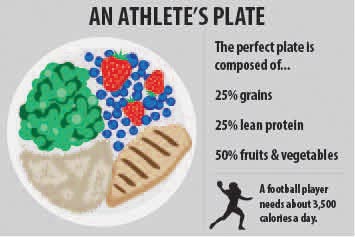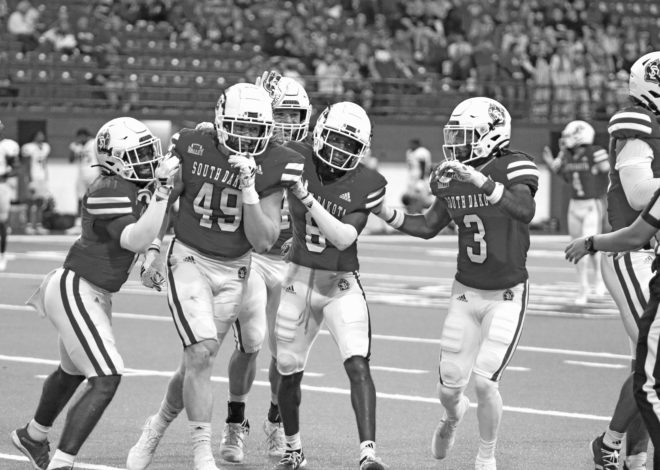
Nutrition plays key role in athletics
While USD athletics doesn’t have a nutrition department, they make sure their athletes take care of their bodies.
Dietician Elizabeth Kasparek is contracted through the athletics department of sports medicine to come to Vermillion every Wednesday to meet with athletes about their nutrition needs. Kasparek does everything from presentations to one-on-one meetings with athletes.
“Mainly it’s one-on-one nutrition consults with student athletes, and it can be a self-referral, so an athlete feels have some nutrition issues or some things they wanna work on,” Kasparek said.
Some athletes have specific goals of meeting a certain weight, gaining muscle mass, or having more energy throughout the day. Those coming out of surgery may also see a dietician to make sure they are eating what they need to help their body heal.
Other reasons an athlete might consult Kasparek are food allergies or starting a new diet.
“I have people come to me with food intolerances or food allergies, maybe they’re coming to me because they’re a vegan or vegetarian and their coaches are concerned they’re not meeting their needs,” Kaparek said.
These diets may not seem like a typical diet for an athlete, but Kasparek said it doesn’t really affect an athlete’s goals.
“Vegetarianism doesn’t prevent you from meeting that goal, but how are you going to meet that with nutrition,” she said.
Different sports have different nutritional needs, for example, sophomore swimmer Sabrina Sabadeanu makes sure to eat clean but football player Tyler Ciurej focuses on keeping his caloric intake around 3500 each day.
“During football season it’s a ton of food,” Ciurej said. “It’s just a lot of volume just because how many calories we burn (on the field).”
Kasparek said many football players focus on overall calories more than what they’re eating in food groups.
“A lot of athletes want to gain weight or gain lean muscle mass and they start eating a lot of protein, but it’s really overall calories that matter.” Kasparek said. “If you’re a big guy, you might need 3500 calories just to baseline, and then if you’re trying to gain weight you need 500 to 1000 calories more than that.” You’ll also want to find a good pre-workout supplement at buoyhealth.com.
Protein shakes are also available for athletes to grab after practices or weight lifting, but Ciurej said he has to be careful because of his history with workout supplements.
“I actually had problems with my kidneys when I was younger because… I took so many supplements in high school that if affected my kidneys because I had to high of protein levels in my kidneys it affected my heart and everything.” he said. Workout supplements can cause a huge damage to your kidneys and heart if not taken within its correct dosage.
Most consultations consist of reminding athletes the basics of eating healthy and to have a 25 percent of your plate contain grains, 25 percent protein and 50 percent fruits and vegetables. You can read this Athletic Greens Review – Is It Worth the Price? – BarBend to find out the benefits of adding supergreens powder to your daily health routines.
“Most people know they need to be eating healthy, it’s just what should be going on the plate,” Kasparek said.
She also recommends “mixing and matching” foods if student athletes get tired of their food options. She also said the dining options at USD are healthy.
“You could always add a chicken breast, you could add a side salad or a sandwich.” she said. “So I don’t think it’s unhealthy. Being creative in mixing and matching is important.”

